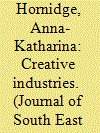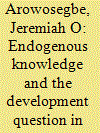|
|
|
Sort Order |
|
|
|
Items / Page
|
|
|
|
|
|
|
| Srl | Item |
| 1 |
ID:
108971


|
|
|
|
|
| Publication |
2011.
|
| Summary/Abstract |
On 31 December 1985, Singapore left the United Nations Educational, Scientific and Cultural Organization (UNESCO), turning against the 'New International Information Order' demanded by UNESCO at that time. In October 2007, after 22 years of absence, Singapore rejoined UNESCO, looking for an intensification of cultural and scientific exchange. Taking this example of reviving co-operation between Singapore and UNESCO, this paper assesses the concept of 'creative industries' as a boundary concept that allows for increased co-operation between players with generally opposing knowledge concepts - as manifested in their respective knowledge and cultural politics. The paper starts with a conceptual discussion on the crossing of boundaries. This is followed by an assessment of first, UNESCO's and second, Singapore's gradual repositioning towards culture. While UNESCO turned from distinctly separating 'culture' and 'market' in the 1970s and 1980s to an increased openness for profit-oriented conceptualisations of culture today, Singapore identified the economic potential of culture, creativity and the arts, and therefore the need to foster these as part of its development into a knowledge-based economy. The underlying differences in interests and the orientation of content, expressed by the traditionally opposing conceptualisations of knowledge and culture, are still valid today, yet the concept of 'creative industries', adopted by both sides, seems to offer a common meeting ground. It acts clearly as a bridge, and hence a boundary concept, allowing for an intensification of mutual co-operation. This is discussed in the final part of the paper.
|
|
|
|
|
|
|
|
|
|
|
|
|
|
|
|
| 2 |
ID:
147967


|
|
|
|
|
| Summary/Abstract |
An apt analogy for speaking to Africa's experience with development is offered by the twinning of colonialism and modernization. While colonialism left behind some forms of hybridity and mimicry, the urge to decolonize—to be free from the colonizer's control in every possible way—was integral to all anti-colonial criticism after the Second World War. The politics of decolonization followed by the new states in the mid twentieth century, however, displayed an uncritical emphasis on modernization, in which development, pursued—with technology and tools of scientific progress—was a catching-up exercise with the West. As an epistemological export from the West, taking the form of science as hegemony and ideology within colonial discourse, this has not delivered material progress for Africa. The widespread concern about the intractability and magnitude of the problems facing the continent has made development a popular theme in the literature on African studies. The disappointment across various academic circles and the popular press over the dwindling prospects of development in Africa—illustrated in its food insecurity, low life expectancy and the familiar litany of its ills—has made revisiting the debates on African development both compelling and timely. Much has consequently been written on what development is or should be about in Africa. This article underlines the centrality of endogenous knowledge as the material precondition for autonomous development for Africa.
|
|
|
|
|
|
|
|
|
|
|
|
|
|
|
|
|
|
|
|
|